英语诗歌的类型 Types of Poetry
what is poetry
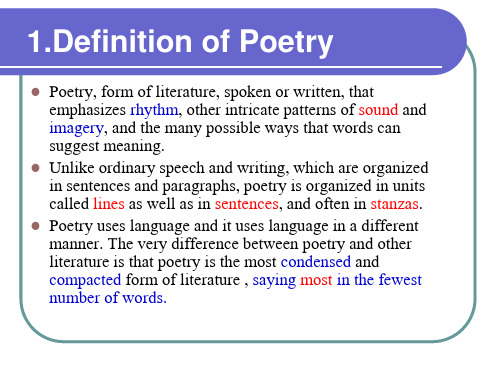
Importance of poetry
TO THE SOCIETY:
Poetry is a part of social culture. It has also been a constant part of our experience of music and culture in the modern world. Poetry has become something that is being fought for in terms of its relevance to creation. Some of the most common signs of poetry in the modern world come in our celebrations of major holidays. In the end, poetry does have an impact on society because it captures our experiences and our lives. It is helping to communicate our biggest dreams and our darkest secrets.
Poems without a fixed beat or regular rhyme scheme
I hear America singing
In this poem, the reader envisions a country of people working for the greater good of mankind. These people come together as part of the whole society developing industry and production. Each person has a different occupation, but each job is important to the bigger picture. The bigger picture and theme being that of a country in which everyone is working together to create a successful and harmonious civilization.
ABC_of_Poetry(英文诗歌知识入门)
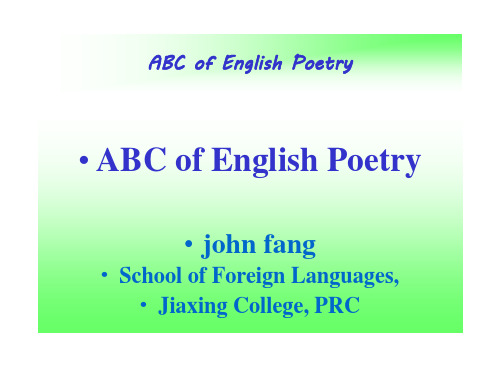
As fair / art thou / my bon/nie lass, So deep / in luve / am I : And I / will luve / thee still,/ my dear, Till a` / the seas / gang dry:
William Blake: The Tyger
1.3 Anapaestic
• 1.3 Anapaestic (抑抑扬格、轻轻重格): 每 个音步由两个非重读音节加一个重读音节构 成。如:三音步抑抑扬格
• O O / O O /
• Like a child / from the womb, Like a ghost / from the tomb, I arise / and unbuild / it again.
Foot
• Foot: the basic unit used in the scansion or measurement of verse. A foot usually contains one accented syllable and one or two unaccented syllables, but the monosyllabic foot, the sponaic foot (spondee) and the dipodic foot are all modifications of this principle. (音步)
•
---Alfred Tennyson(1809-1892): Crossing the Bar
Ballad: The Babes in the Wood
• • • • • • • • Sore sick he was, and like to die, No help his life could save; His wife by him as sick did lie, And both possest one grave. No love between these two was lost, Each was to other kind, In love they liv‘d, in love they died, And left two babes behind. A B A B
英语诗歌分类
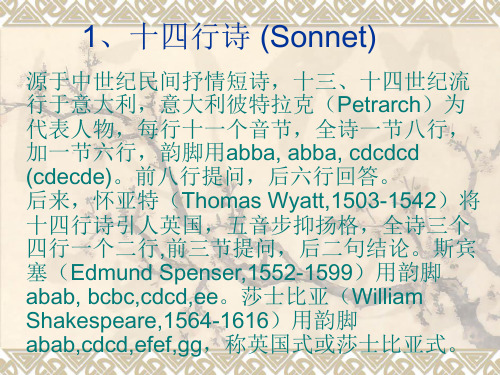
The Canterbury Tales---General Prologue
As soon as April pierces to the root The drought of March, and bathes each bud and shoot Through every vein of sap with gentle showers From whose engendering liquor spring the flowers; When zephyrs have breathed softly all about Inspiring every wood and field to sprout, And in the zodiac the youthful sun His journey halfway through the Ram has run; When little birds are busy with their song Who sleep with open eyes the whole night long Life stirs their hearts and tingle in them so, Then off as pilgrims people long to go, And palmers to set out for distant strands And foreign shrines renowned in many lands. And specially in England people ride To Canterbury from every countryside To visit there the blessed martyred saint Who gave them strength when they were sick and faint.
英语诗歌的类别
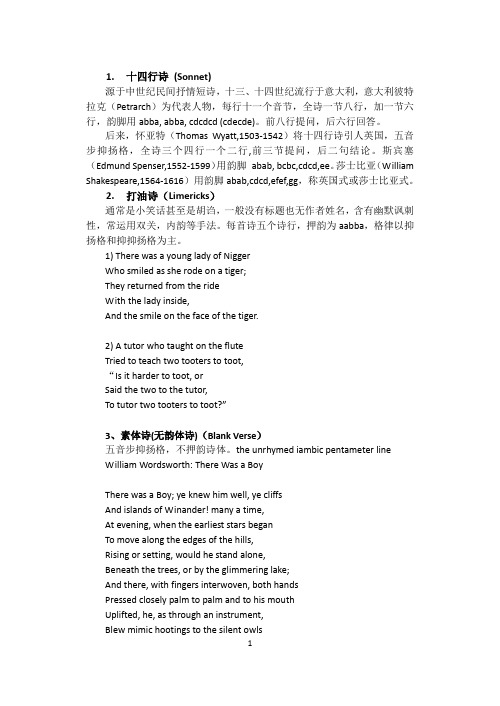
1.十四行诗(Sonnet)源于中世纪民间抒情短诗,十三、十四世纪流行于意大利,意大利彼特拉克(Petrarch)为代表人物,每行十一个音节,全诗一节八行,加一节六行,韵脚用abba, abba, cdcdcd (cdecde)。
前八行提问,后六行回答。
后来,怀亚特(Thomas Wyatt,1503-1542)将十四行诗引人英国,五音步抑扬格,全诗三个四行一个二行,前三节提问,后二句结论。
斯宾塞(Edmund Spenser,1552-1599)用韵脚abab, bcbc,cdcd,ee。
莎士比亚(William Shakespeare,1564-1616)用韵脚abab,cdcd,efef,gg,称英国式或莎士比亚式。
2.打油诗(Limericks)通常是小笑话甚至是胡诌,一般没有标题也无作者姓名,含有幽默讽刺性,常运用双关,内韵等手法。
每首诗五个诗行,押韵为aabba,格律以抑扬格和抑抑扬格为主。
1) There was a young lady of NiggerWho smiled as she rode on a tiger;They returned from the rideWith the lady inside,And the smile on the face of the tiger.2) A tutor who taught on the fluteTried to teach two tooters to toot,“Is it harder to toot, orSaid the two to the tutor,To tutor two tooters to toot?”3、素体诗(无韵体诗)(Blank Verse)五音步抑扬格,不押韵诗体。
the unrhymed iambic pentameter lineWilliam Wordsworth: There Was a BoyThere was a Boy; ye knew him well, ye cliffsAnd islands of Winander! many a time,At evening, when the earliest stars beganTo move along the edges of the hills,Rising or setting, would he stand alone,Beneath the trees, or by the glimmering lake;And there, with fingers interwoven, both handsPressed closely palm to palm and to his mouthUplifted, he, as through an instrument,Blew mimic hootings to the silent owlsThat they might answer him.—And they would shoutAcross the watery vale, and shout again,Responsive to his call,—with quivering peals,And long halloos, and screams, and echoes loudRedoubled and redoubled; concourse wildOf jocund din! And, when there came a pauseOf silence such as baffled his best skill:Then, sometimes, in that silence, while he hungListening, a gentle shock of mild surpriseHas carried far into his heart the voiceOf mountain-torrents; or the visible sceneWould enter unawares into his mindWith all its solemn imagery, its rocks,Its woods, and that uncertain heaven receivedInto the bosom of the steady lake.This boy was taken from his mates, and diedIn childhood, ere he was full twelve years old.Pre-eminent in beauty is the valeWhere he was born and bred: the churchyard hangsUpon a slope above the village-school;And through that churchyard when my way has ledOn summer-evenings, I believe that thereA long half-hour together I have stoodMute —looking at the grave in which he lies!3.自由诗(Free Verse)自由诗(Free Verse):现代诗中常见的体式,长短不同的诗行存在于同一首诗中,不讲究押韵与格律,只注重诗歌所表达的意象和传递的情感。
英文诗歌赏析翻译
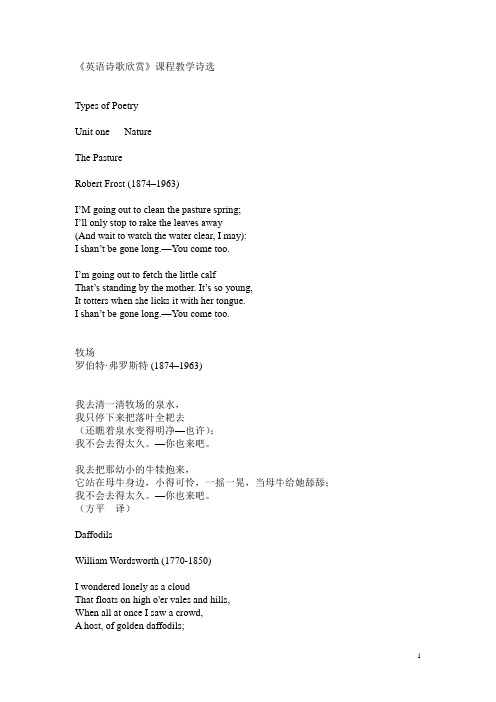
《英语诗歌欣赏》课程教学诗选Types of PoetryUnit one NatureThe PastureRobert Frost (1874–1963)I’M going out to clean the pasture spring;I’ll only stop to rake the leaves away(And wait to watch the water clear, I may):I shan’t be gone long.—You come too.I’m going out to fetch the little calfThat’s standing by the mother. It’s so young,It totters when she licks it with her tongue.I shan’t be gone long.—You come too.牧场罗伯特·弗罗斯特 (1874–1963)我去清一清牧场的泉水,我只停下来把落叶全耙去(还瞧着泉水变得明净—也许);我不会去得太久。
—你也来吧。
我去把那幼小的牛犊抱来,它站在母牛身边,小得可怜,一摇一晃,当母牛给她舔舔;我不会去得太久。
—你也来吧。
(方平译)DaffodilsWilliam Wordsworth (1770-1850)I wondered lonely as a cloudThat floats on high o'er vales and hills,When all at once I saw a crowd,A host, of golden daffodils;Beside the lake, beneath the trees, Fluttering and dancing in the breeze. Continuous as the stars that shineAnd twinkle on the Milky Way,They stretched in never-ending line Along the margin of a bay:Ten thousand saw I at a glanceTossing their heads in sprightly dance. The waves beside them danced, but they Out-did the sparking waves in glee:A Poet could not but be gayIn such a jocund company:I gazed—and gazed—but little thought What wealth the show to me had brought: For oft, when on my couch I lieIn vacant or in pensive mood,They flash upon that inward eyeWhich is the bliss of solitude;And then my heart with pleasure fills, And dances with the daffodils.咏水仙威廉华兹华斯(1770-1850)我好似一朵孤独的流云,高高地飘游在山谷之上,突然我看见一大片鲜花,是金色的水仙遍地开放,它们开在湖畔,开在树下,它们随风嬉舞,随风波荡。
英文诗歌赏析翻译
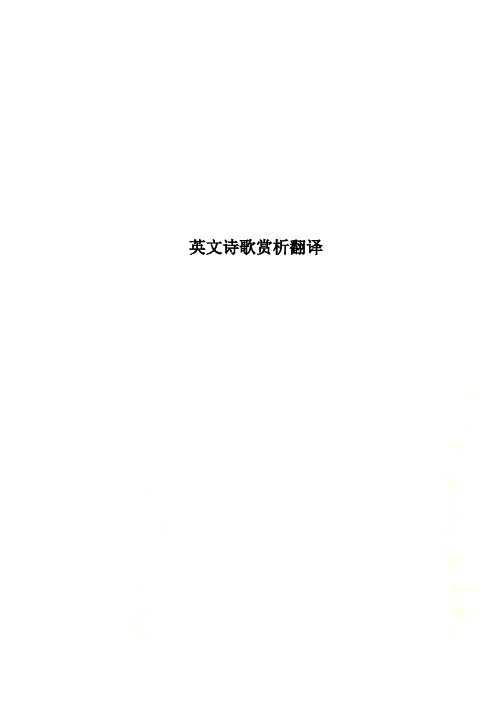
罗伯特彭斯(1759–1796)
啊,我爱人象一朵红红的玫瑰,
它在六月里初开;
啊,我爱人象一支乐曲,
它美妙地演奏起来。
你是那么漂亮,美丽的姑娘,
我爱你是那么深切;
我会一直爱你,亲爱的,
一直到四海枯竭。
一直到四海枯竭,亲爱的,
到太阳把岩石烧化;
我会一直爱你,亲爱的,
只要生命之流不绝。
再见吧,我唯一的爱人,
Westward declines the sun;
Far, far from home is the heartbroken one.
《天净沙·秋思》
马致远(约1251-1321)
枯藤老树昏鸦,
小桥流水人家,
古道西风瘦马。
夕阳西下,
断肠人在天涯。
The Red Wheelbarrow
William Carlos Williams
And I shall have some peace there,
For peace comes dropping slow,
Dropping from the veils of the morning
To where the cricket sings;
There midnight's all a glimmer,
让我和你小别片刻;
我会回来的,亲爱的,
即使我们万里相隔。
(袁可嘉译)
Love meLittle,Love meLong
Norton
Love melittle, loveme long,
Is the burden ofmysong.
Love that is too hot or strong
英语诗歌简介English Poetry
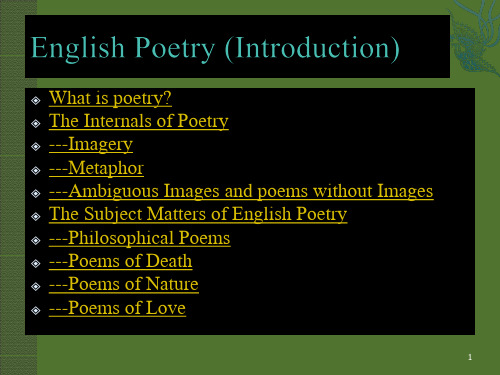
b. To induce the reader a kind of attitude to something or coalition with something else. Because I could not stop for Death— He kindly stopped for me— The Carriage held but just Ourselves— And Immortality.
2
1. The genealogical level
2. The typographical level
3
《亲爱的傻瓜》
天下武功第一的欧阳锋
竟然被郭靖用计活捉
他百思不得其解 对郭靖说了这样两句话: “你知道我平生最恨什么吗? 我最恨落在傻瓜手里”
4
《一个人来到田纳西》
毫无疑问
“是一种用美的文字……音律的绘画的文字…… 表 写人的情绪中的意境。” -宗白华,《美学散步》 “画者,天地无声之诗;诗者,天地无色之画。” -叶燮 “Painting is silent poetry, and poetry is a speaking picture.”----Simonides (556 BC - 468 BC) (画是无声的诗,诗是有声的画。) Painting (spatial art) presents points in space while poetry, as temporal art ,presents points in succession. 黑格尔认为,作为语言艺术的诗歌是第三种艺术。 绘画提供明确的外在形象(form),但在表现内心生 活方面还有欠缺,于是才有了音乐(melody);音乐在 表现内心生活的特殊具体方面欠明确,于是才有了 诗歌(language)。 8
英语诗歌-英语诗类型
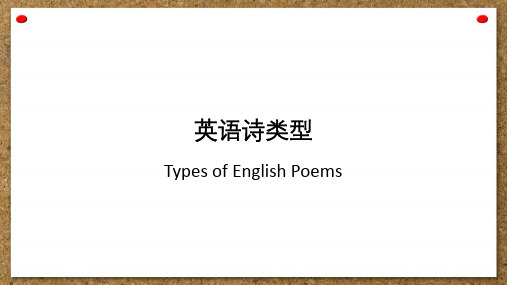
• Originating from Latin and Greek sources, blank verse is widely employed as a vehicle in English dramatic poetry and , to create specific grandeur. Blank verse has similarity to normal speech but it is written in a variety of patterns, which bring interruptions such as pauses. Therefore, the intention is to produce a formal rhythmical pattern that creates musical effect. Hence, it tends to capture the attention of the readers and the listeners, which is its primary objective.
• Folk (or traditional) ballads are anonymous and recount tragic, comic, or heroic stories with emphasis on a central dramatic event.
英语诗歌的类型_Types_of_Poetry
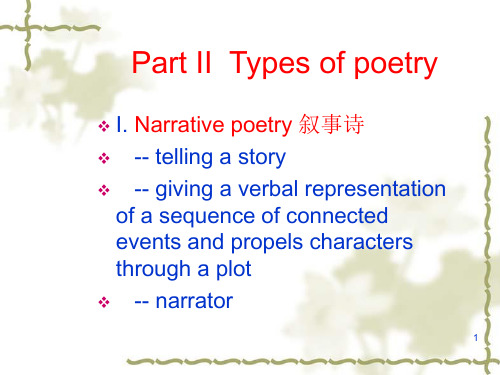
2. Ode 颂诗 -- a form of lyric poem in which the poet highly celebrates a person, a thing or an event -- length, stanza forms, style and purpose -- Shelley: Ode to the West Wind Keats: Ode to Autumn
14
2. Reflective poetry -- treating of reflections and thoughts of the author -- expressing a mere reflection, or more serious thought -- expounding human life, the relationships of man with the world by means of various methods of other types of poetry
17
5. nature poems
love poems animal poems death poems friendship poems …
18
Narrative story
Lyric song
action
emotion
5
1. Sonnet 十四行诗 -- a fourteen-line poem, written in iambic pentameter ( lines with ten syllables, with accents falling on every second syllable) -- Petrarch in Italy -- England: Thomas Wyatt, Henry Howard -- Spenserian sonnet: -- Shakespearean sonnet: abab, cdcd, efef, gg
英语诗歌入门1.
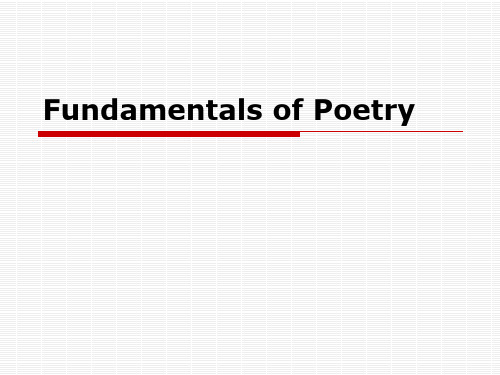
Ballads(民谣) (民谣)
Ballads are perhaps the most popular form of narrative poetry. Originally ballads were meant to be sung or recited. Folk ballads (popular ballads as they are sometimes called) were passed on orally, only to be written down much later.
Epic(史诗) (史诗)
The grandest of narratives is the epic. Epics are long narrative poems that record the adventures of a hero whose exploits are important to the history of a nation. Typically they chronicle the origins of a civilization and embody its central beliefs and values. Epics tend to be larger than life as they recount valorous deeds enacted in vast landscapes. The epic style is as grand as the action; the conventions require that the epic be formal, complex, and serious — suitable to its important subjects.
英语诗歌的类别
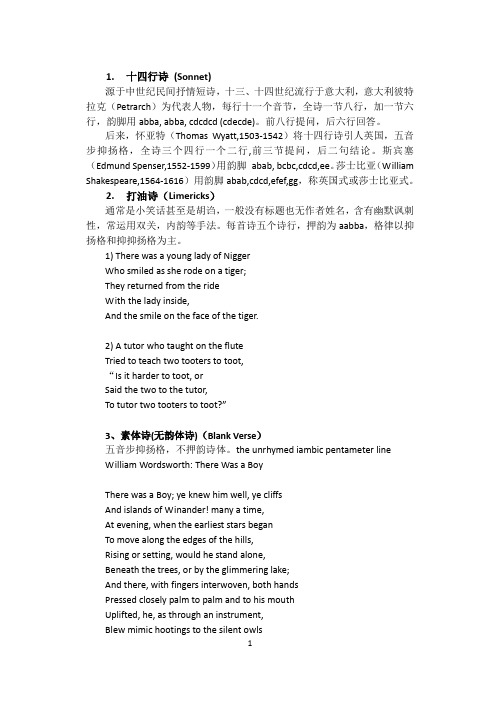
1.十四行诗(Sonnet)源于中世纪民间抒情短诗,十三、十四世纪流行于意大利,意大利彼特拉克(Petrarch)为代表人物,每行十一个音节,全诗一节八行,加一节六行,韵脚用abba, abba, cdcdcd (cdecde)。
前八行提问,后六行回答。
后来,怀亚特(Thomas Wyatt,1503-1542)将十四行诗引人英国,五音步抑扬格,全诗三个四行一个二行,前三节提问,后二句结论。
斯宾塞(Edmund Spenser,1552-1599)用韵脚abab, bcbc,cdcd,ee。
莎士比亚(William Shakespeare,1564-1616)用韵脚abab,cdcd,efef,gg,称英国式或莎士比亚式。
2.打油诗(Limericks)通常是小笑话甚至是胡诌,一般没有标题也无作者姓名,含有幽默讽刺性,常运用双关,内韵等手法。
每首诗五个诗行,押韵为aabba,格律以抑扬格和抑抑扬格为主。
1) There was a young lady of NiggerWho smiled as she rode on a tiger;They returned from the rideWith the lady inside,And the smile on the face of the tiger.2) A tutor who taught on the fluteTried to teach two tooters to toot,“Is it harder to toot, orSaid the two to the tutor,To tutor two tooters to toot?”3、素体诗(无韵体诗)(Blank Verse)五音步抑扬格,不押韵诗体。
the unrhymed iambic pentameter lineWilliam Wordsworth: There Was a BoyThere was a Boy; ye knew him well, ye cliffsAnd islands of Winander! many a time,At evening, when the earliest stars beganTo move along the edges of the hills,Rising or setting, would he stand alone,Beneath the trees, or by the glimmering lake;And there, with fingers interwoven, both handsPressed closely palm to palm and to his mouthUplifted, he, as through an instrument,Blew mimic hootings to the silent owlsThat they might answer him.—And they would shoutAcross the watery vale, and shout again,Responsive to his call,—with quivering peals,And long halloos, and screams, and echoes loudRedoubled and redoubled; concourse wildOf jocund din! And, when there came a pauseOf silence such as baffled his best skill:Then, sometimes, in that silence, while he hungListening, a gentle shock of mild surpriseHas carried far into his heart the voiceOf mountain-torrents; or the visible sceneWould enter unawares into his mindWith all its solemn imagery, its rocks,Its woods, and that uncertain heaven receivedInto the bosom of the steady lake.This boy was taken from his mates, and diedIn childhood, ere he was full twelve years old.Pre-eminent in beauty is the valeWhere he was born and bred: the churchyard hangsUpon a slope above the village-school;And through that churchyard when my way has ledOn summer-evenings, I believe that thereA long half-hour together I have stoodMute —looking at the grave in which he lies!3.自由诗(Free Verse)自由诗(Free Verse):现代诗中常见的体式,长短不同的诗行存在于同一首诗中,不讲究押韵与格律,只注重诗歌所表达的意象和传递的情感。
关于poem的英语作文

关于poem的英语作文英文回答:Poetry is a form of literature that uses words to evoke emotion, create imagery, and communicate ideas. It can be used to tell stories, express feelings, or explore complex themes. Poems can be written in a variety of styles, from free verse to formal sonnets. They can be short or long, simple or complex.The use of literary devices such as metaphor, simile, and imagery helps poets to create vivid and memorable images in the minds of their readers. These devices allow poets to express complex ideas in a concise and evocative way.Poetry can be used to explore a wide range of human emotions, from love and joy to grief and despair. It can also be used to explore social and political issues, or to simply capture the beauty of the natural world.There are many different types of poetry, including lyric, narrative, and dramatic. Each type of poetry has its own unique set of conventions and techniques. Lyric poetry is the most common type of poetry and is often used to express personal thoughts and feelings. Narrative poetry tells a story, while dramatic poetry is written in the form of a play.Poetry can be a challenging but rewarding form of literature. It can help us to understand ourselves and the world around us. It can also be a source of beauty, inspiration, and joy.中文回答:诗歌是一种使用语言来引起情感、创造意象和传达思想的文学形式。
英语诗歌的类型
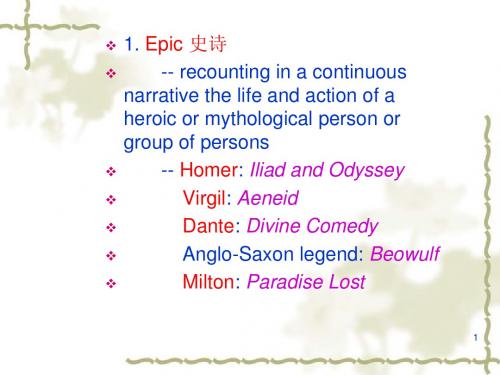
-- the Middle ages
-- common people, oral tradition
-- traditional ballad: Robin Hood Ballads
-- literary ballad: Coleridge: The Rime of the Ancient Mariner
5
2. Ode 颂诗
-- a form of lyric poem in which the poet highly celebrates a person, a thing or an event
-- length, stanza forms, style and purpose
-- Shelley: Ode to the West Wind
Virgil: Aeneid
Dante: Divine Comedy
Anglo-Saxon legend: Beowulf
Milton: Paradise Lost
1
2. Ballad 歌谣
-- a narrative poem of folk song which tells a story in simple colloquial language, usually in four-line stanzas with the second and fourth lines rhymed
2
3. Romance 传奇 -- primarily medieval fiction in
verse or prose dealing with adventures of chivalry and love -- Frem -- Sir Gawain and the Green Knight -- Le Morte d’Arthur
poetry诗歌.
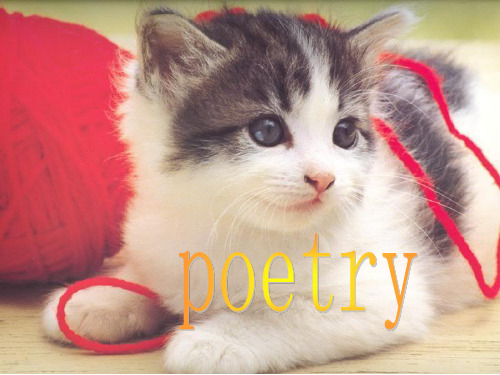
Poetry 指诗歌、散文这一类文体 Poem 就指一首诗 如:《静夜思》是a poem; 而《静夜思》、《望岳》等则都是poetry。
Definition of poetry
It is a literary form which is written in lines Compressed content Rich imagery Beautiful harmony Great artistic appeal
Importance of poetry Nhomakorabea
TO HUMAN BEINGS: Poetry gives a person a voice. This voice can be used to express a variety of things. Often, people use poetry to express how they feel when they think the yare misunderstood. Poetry is real. Real people have written it to express real emotion that is normally hidden.
How Do I Love Thee?
How do I love thee? Let me count the ways. I love thee to the depth and breadth and height My soul can reach, when feeling out of sight For the ends of Being and ideal Grace. I love thee to the level of every day's Most quiet need, by sun and candlelight. I love thee freely, as men strive for Right; I love thee purely, as they turn from Praise. I love with a passion put to use In my old grieves, and with my childhood's faith. I love thee with a love I seemed to lose With my lost saints, I love thee with the breath, Smiles, tears, of all my life! and, if God choose, I shall but love thee better after death.
英语诗歌——精选推荐

英语诗歌Samples –type of poetryNARRATIVE (1)Epic (1)THE ILIAD (1)THE AENEID (2)Paradise Lost (2)Romances (3)Troilus and Criseyde (3)Idylls of the King (3)Ballads (4)The Wife of Usher’s Well (4)Robin Hood And Allin-A-Dale (5)LYRICS (5)Auld lang syne (5)Western Wind (6)Hark, Hark, the Lark (6)The Isles of Greece (6)THE DAFFODILS William Wordsworth (6)DRAMATIC (7)Hamlet (7)Julius Caesar (8)NarrativeEPICTHE ILIAD by Homer, translated by Samuel ButlerBOOK ISing, O goddess, the anger of Achilles son of Peleus, that brought countless ills upon the Achaeans. Many a brave soul did it send hurrying down to Hades, and many a hero did it yield a prey to dogs and vultures, for so were the counsels of Jove fulfilled from theday on which the son of Atreus, king of men, and great Achilles, first fell out with one another.THE AENEID by VirgilBOOK IArms, and the man I sing, who, forc'd by fate,And haughty Juno's unrelenting hate,Expell'd and exil'd, left the Trojan shore.Long labors, both by sea and land, he bore,And in the doubtful war, before he wonThe Latian realm, and built the destin'd town;His banish'd gods restor'd to rites divine,And settled sure succession in his line,From whence the race of Alban fathers come, And the long glories of majestic RomeO Muse! the causes and the crimes relate;What goddess was provok'd, and whence her hate; For what offense the Queen of Heav'n beganTo persecute so brave, so just a man;Involv'd his anxious life in endless cares,Expos'd to wants, and hurried into wars!Can heav'nly minds such high resentment show, Or exercise their spite in human woe?Paradise Lost by John MiltonBook 1Of Mans First Disobedience, and the FruitOf that Forbidden Tree, whose mortal tast Brought Death into the World, and all our woe, With loss of EDEN, till one greater ManRestore us, and regain the blissful Seat,Sing Heav'nly Muse, that on the secret topOf OREB, or of SINAI, didst inspireThat Shepherd, who first taught the chosen Seed, In the Beginning how the Heav'ns and Earth Rose out of CHAOS: Or if SION HillDelight thee more, and SILOA'S Brook that flow'd Fast by the Oracle of God; I thenceInvoke thy aid to my adventrous Song,That with no middle flight intends to soarAbove th' AONIAN Mount, while it pursues Things unattempted yet in Prose or Rhime.ROMANCESTroilus and Criseyde by Geoffrey Chaucer BOOK IThe double sorwe of Troilus to tellen, That was the king Priamus sone of Troye, In lovinge, how his aventures fellenFro wo to wele, and after out of Ioye,My purpos is, er that I parte fro ye. Thesiphone, thou help me for tendyte Thise woful vers, that wepen as I wryte!To thee clepe I, thou goddesse of torment, Thou cruel Furie, sorwing ever in peyne; Help me, that am the sorwful instrument That helpeth lovers, as I can, to pleyne! For wel sit it, the sothe for to seyne,A woful wight to han a drery fere,And, to a sorwful tale, a sory chere.Idylls of the King By Tennyson The Coming of ArthurLeodogran, the King of Cameliard,Had one fair daughter, and none other child; And she was the fairest of all flesh on earth, Guinevere, and in her his one delight.For many a petty king ere Arthur cameRuled in this isle, and ever waging warEach upon other, wasted all the land;And still from time to time the heathen host Swarmed overseas, and harried what was left.And so there grew great tracts of wilderness, Wherein the beast was ever more and more,But man was less and less, till Arthur came.For first Aurelius lived and fought and died,And after him King Uther fought and died,But either failed to make the kingdom one.And after these King Arthur for a space,And through the puissance of his Table Round, Drew all their petty princedoms under him.Their king and head, and made a realm, and reigned.BALLADSThe Wife of Usher’s WellThere lived a Wife at Usher’s Well,And a wealthy wife was she:She had three stout and stalwart sons,And sent them over the sea.They hadna been a week from her,A week but barely ane,When word came to the carlin wifeThat her three sons were gane.Robin Hood And Allin-A-DaleCome listen to me, you gallants so free, All you that love mirth for to hear, And I will tell you of a bold ourlaw That lived in Nottinghamshire.As Robin Hood in the forest stood,All under the greenwood tree, There he was aware of a brave young man As fine as fine might be.Lyrics --Auld lang syneBy Robert BurnsThe Should auld acquaintance be forgot, And never brought to min’?Should auld acquaintance be forgot,And days o’ lang syne?We twa hae run about the braes,And pu’d the gowans fine,But we’ve wandered mony a weary foot, Sin’ auld lang syne.We twa hae paidled I’ the burn,From morning sun till dine;But seas between us braid hae roared, Sin’ auld lane syne.And there’s a hand, my trusty fiere,And gie’s a hand o’ thine;And we’ll tak a right gude-willie waught, For auld lang syne.And surely ye’ll be your pint-stowp,And surely I’ll be mine;And we’ll tak a cup o’ kindness yet,For auld lang syne.For auld lang syne, my dear,For auld lang syne,We’ll tak a cup o’ kindness yet,For auld lang syne.Western WindWestern wind, when wilt thou blow,The small rain down can rain?Christ, if my love were in my arms,And I in my bed again!Hark, Hark, the LarkBy ShakespeareHark! Hark! The lark at heaven’s gate sings, And Phoebeus ‘gins arise,His steeds to water at those springsOn chaliced flowers that lies;And winkling Mary-buds beginTo ope their golden eyes.With every thing that pretty is,My lady sweet, arise;Arise, arise!The Isles of GreeceBy ByronThe isles of Greece, the isles of Greece!Where burning Sappho loved and sung, Where grew the arts of war and peace, Where Delos rose, and Phoebus sprung! Eternal summer gilds them yet,But all, except the sun, is set.THE DAFFODILSWilliam WordsworthI wander’d lonely as a cloudThat floats on high o’er vales and hills, When all at once I saw a crowd,A host , of golden daffodils;Beside the lake, beneath the trees, Fluttering and dancing in the breeze.Continuous as the stars that shineAnd twinkle on the Milky way,They stretch’d in never-ending lineAlong the margin of a bay:Ten thousand saw I at a glance,Tossing their heads in sprightly dance.The waves beside them danced, but theyOut-did the sparkling waves in glee:A poet could not but be gayIn such a jocund company!I gazed –and gazed –but little thoughtWhat wealth the show to me had brought:For oft, when on my couch I lieIn vacant or in pensive mood,They flash upon that inward eyeWhich is the bliss of solitude;And then my heart with pleasure fills,And dances with the daffodils.DRAMATICHamletBy ShakespeareHamlet:To be, or not to be, --- that is the question: Whether ’tis nobler in the mind to suffe rThe slings and arrows of outrageous Fortune,Or to take arms against a sea of troubles,And by opposing end them? To die, -- to sleep, -- No more; and, by a sleep, to say we endThe heart-ache, and the thousand natural shocks That flesh is heir to, --- ’tis a consummation Devoutly to be wish’d. To die, --- to sleep;--…Julius CaesarBy ShakespeareANTONY. Friends, Romans, countrymen, lend me your ears!I come to bury Caesar, not to praise him.The evil that men do lives after them,The good is oft interred with their bones;So let it be with Caesar. The noble BrutusHath told you Caesar was ambitious;If it were so, it was a grievous fault,And grievously hath Caesar answer'd it.Here, under leave of Brutus and the rest-For Brutus is an honorable man;So are they all, all honorable men-Come I to speak in Caesar's funeral.He was my friend, faithful and just to me;But Brutus says he was ambitious,And Brutus is an honorable man.He hath brought many captives home to Rome,Whose ransoms did the general coffers fill.Did this in Caesar seem ambitious?When that the poor have cried, Caesar hath wept;Ambition should be made of sterner stuff:Yet Brutus says he was ambitious,And Brutus is an honorable man.You all did see that on the LupercalI thrice presented him a kingly crown,Which he did thrice refuse. Was this ambition? Yet Brutus says he was ambitious,And sure he is an honorable man.I speak not to disprove what Brutus spoke,But here I am to speak what I do know.You all did love him once, not without cause; What cause withholds you then to mourn for him? O judgement, thou art fled to brutish beasts,And men have lost their reason. Bear with me; My heart is in the coffin there with Caesar,And I must pause till it come back to me.。
英语诗歌的韵律与类型.
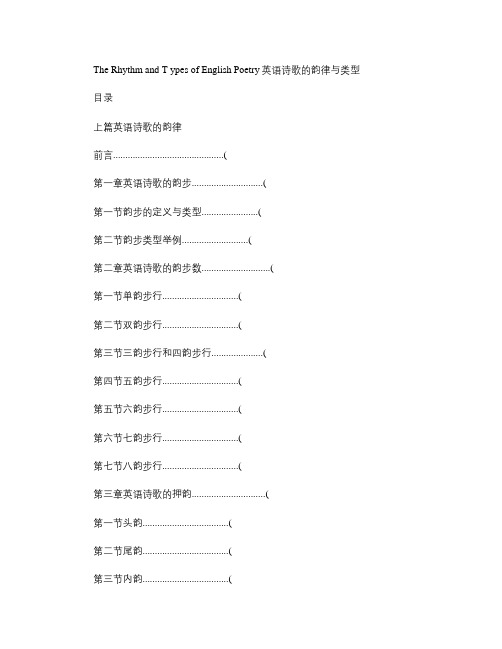
The Rhythm and T ypes of English Poetry英语诗歌的韵律与类型目录上篇英语诗歌的韵律前言.............................................(第一章英语诗歌的韵步.............................(第一节韵步的定义与类型.......................(第二节韵步类型举例...........................(第二章英语诗歌的韵步数............................(第一节单韵步行...............................(第二节双韵步行...............................(第三节三韵步行和四韵步行.....................(第四节五韵步行...............................(第五节六韵步行...............................(第六节七韵步行...............................(第七节八韵步行...............................(第三章英语诗歌的押韵..............................(第一节头韵...................................(第二节尾韵...................................(第三节内韵...................................(第四节元韵...................................(第五节和韵...................................(第六节目韵...................................(第四章英语诗歌的基本押韵格式......................( 第一节基本押韵格式...........................(第二节基本押韵格式的组合使用.................(第五章十四行诗的押韵格式.......................(第一节彼特拉克体..........................(第二节莎士比亚体..........................(第三节斯宾塞体............................(第六章诗行与韵律...............................(第一节结句行..............................(第二节连续行..............................(第三节音节增减............................(第四节句式倒装............................(第七章五行打油诗与短回旋诗.....................(第一节五行打油诗..........................(第二节短回旋诗............................(第八章素体诗与自由诗...........................(第一节素体诗..............................(第二节自由诗..............................(下篇英语诗歌的类型第九章叙事诗...................................( 第一节史诗.................................(第二节歌谣.................................(第三节戏剧诗...............................( 第四节故事诗...............................( 第十章抒情诗...................................( 第一节颂诗..................................(第二节挽歌..................................(第三节婚庆曲................................( 第四节歌..................................(第五节田园短诗............................( 第六节田园牧歌............................( 第七节爱情小诗............................( 第八节哲理诗..............................(第九节宗教诗..............................(第十节赞美诗..............................(第十一节墓志铭.............................(第十二节收场白............................(第十一章融入中国文化的英语诗歌.................(前言《英语诗歌的韵律与类型》是出于教学的需要而编写的。
英语诗歌简明术语表
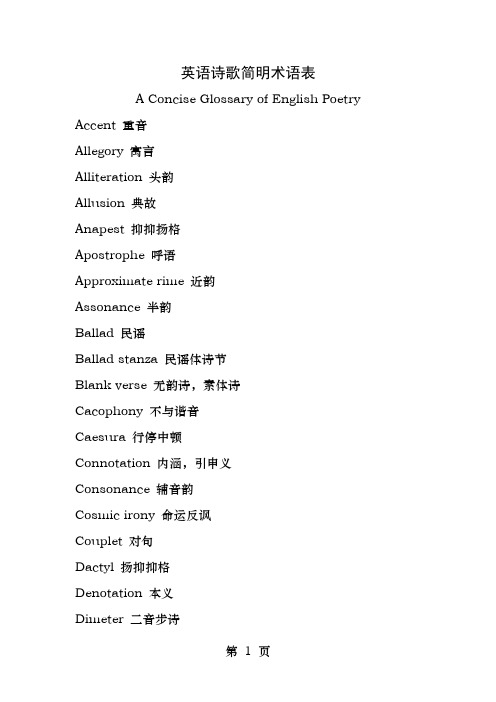
英语诗歌简明术语表A Concise Glossary of English Poetry Accent 重音Allegory 寓言Alliteration 头韵Allusion 典故Anapest 抑抑扬格Apostrophe 呼语Approximate rime 近韵Assonance 半韵Ballad 民谣Ballad stanza 民谣体诗节Blank verse 无韵诗,素体诗Cacophony 不与谐音Caesura 行停中顿Connotation 内涵,引申义Consonance 辅音韵Cosmic irony 命运反讽Couplet 对句Dactyl 扬抑抑格Denotation 本义Dimeter 二音步诗Doggerel 打油诗Dramatic irony 戏剧性反讽Dramatic monologue 戏剧性独白End rhyme 尾韵End-stopped line 行尾停顿诗行English or Shakespearean sonnet 英式/莎士比亚体十四行诗Enjambment 跨行连续Epic 史诗Euphony 谐音Exact rhyme 全韵Eye rhyme 视觉韵Feminine rhyme 阴韵Figure of speech 修辞手法Fixed form 固定诗体Foot 音步Free verse 自由诗Haiku 俳句Heroic couplet 英雄偶句体Heptameter 七音步诗行Hexameter 六音步诗行Hyperbole 夸张Iamb 抑扬格Imagery 意象Internal rhyme 行中韵Irony 反讽,反语Italian or Petrarchan sonnet 意式/比特拉克体十四行诗Limerick 五行打油诗Literary ballad 文人民谣Lyric 抒情诗Masculine rhyme 阳韵Metaphor 暗喻,隐喻Meter 格律,韵律Metonymy 换喻,转喻Monometer 单音步诗行Narrative poem 叙事诗Octameter 八音步诗行Octave 八行诗节Ode 颂诗Onomatopoeia 拟声法Open form 开放诗体Overstatement 夸张Oxymoron 矛盾形容法Paradox 悖论Pentameter 五音步诗行Personification 拟人法Picture poem 涂画诗Prose poem 散文诗Quatrain 四节诗行Refrain 叠句,副歌Rhyme or rime 押韵Rhyme scheme 押韵格式Rhythm 节奏,韵律,格律Run-on line 连续诗行Sarcasm 讥刺Satire 讽刺Scansion 韵律分析,韵律图示Sestet 六节诗行Simile 明喻Situational irony 情景反讽Sonnet 十四行诗Speaker 说话者Spondee 扬扬格Stanza 诗节Stress 重音Symbol 象征Synecdoche 提喻Tercet 三行诗节Terza rima 三行诗节隔行押韵法Tetrameter 四音步诗行Theme 主题Tone 语气,语调trimeter 三音步诗行Triplet 同韵三行联句Trochee 扬抑格Understatement 低调陈述,轻描淡写Verbal irony 言辞反讽Verse 散文诗Villanelle 维拉内拉体。
- 1、下载文档前请自行甄别文档内容的完整性,平台不提供额外的编辑、内容补充、找答案等附加服务。
- 2、"仅部分预览"的文档,不可在线预览部分如存在完整性等问题,可反馈申请退款(可完整预览的文档不适用该条件!)。
- 3、如文档侵犯您的权益,请联系客服反馈,我们会尽快为您处理(人工客服工作时间:9:00-18:30)。
Criticism
16
❖ 4. Satirical poetry ❖ -- exhibiting or examining human
or individual vices, follies, abuses, or shortcomings ❖ -- by means of ridicule, derision, burlesque, irony, or other methods to bring about improvement ❖ -- Alexander Pope: The Rape of the Lock ❖ George Gordon Byron: Don Juan
❖ -- usually idealizing shepherds’ lives in order to create an image of peaceful and uncorrupted existence
❖ -- describing the simplicity, charm and serenity attributed to country
17
❖ 5.
❖ ❖ ❖ ❖ ❖
nature poems love poems animal poems death poems friendship poems …
18
shorter and less formal than an elegy, and often represented as a text meant to be sung aloud ❖ -- William Shakespeare: Full Fathom Five (from Act I, Scene II, The Tempest)
4
II. Lyric poetry 抒情诗
❖ -- taking its name from songs sung by individuals or a chorus accompanied by the lyre
❖ -- possibly the oldest: the Song of Solomon and the Psalms
❖ -- often didactic
❖ -- William Wordsworth: Composed
Upon Westminster Bridge
14
❖ 2. Reflective poetry ❖ -- treating of reflections and
thoughts of the author ❖ -- expressing a mere reflection, or
❖
Virgil: Aeneid
❖
Dante: Divine Comedy
❖
Anglo-Saxon legend: Beowulf
❖
Milton: Paradise Lost
2
❖ 2. Ballad 歌谣
❖ -- a narrative poem of folk song which tells a story in simple colloquial language, usually in four-line stanzas with the second and fourth lines rhymed
❖
Keats: Ode to Autumn
7
❖ 3. Song 歌 ❖ -- a short lyric poem intended
to be set to music in either vocal performance or with accompaniment of musical instruments ❖ -- Ben Jonson: Song: to Celia
more serious thought ❖ -- expounding human life, the
relationships of man with the world by means of various methods of other types of poetry
15
❖ 3. Didactic poetry ❖ -- to instruct or to persuade, to
❖ -- the border area between England and Scotland
❖ -- the Middle ages
❖ -- common people, oral tradition
❖ -- traditional ballad: Robin Hood Ballads
❖ -- literary ballad: Coleridge: The Rime of the Ancient Mariner
Part II Types of poetry
❖ I. Narrative poetry 叙事诗 ❖ -- telling a story ❖ -- giving a verbal representation
of a sequence of connected events and propels characters through a plot ❖ -- narrator
13
IV. Other types of poetry
❖ 1. Descriptive poetry
❖ -- devoted to the portray of external objects or scenes
❖ -- giving expression to the poet’s thoughts and feelings aroused by the various scenes and objects in the natural world
❖ -- Francesco Petrarch – Italian sonnet ❖ -- love as the most important subject matter ❖ -- different from narrative poems:
Narrative story action
Lyric
❖ -- John Donn: The Sun Rising
❖
Robert Browning: Parting at
Morning
11
❖ 7. Pastoral 田园诗
❖ -- an artistic composition dealing with the life of shepherds or with a simple, rural existence
8
❖ 4. Elegy 挽诗;挽歌;哀歌
❖ -- elegiac (Greek and Roman)
❖ -- written in couplets consisting of a hexameter line followed by a pentameter line
❖ -- usually a reflective poem of lamentation or regret, with no set metrical form, generally of melancholy tone, often on death
3
❖ 3. Romance 传奇 ❖ -- primarily medieval fiction in
verse or prose dealing with adventures of chivalry and love ❖ -- French origin ❖ -- feudal system ❖ -- Sir Gawain and the Green Knight ❖ -- Le Morte d’Arthur
6
❖ 2. Ode 颂诗
❖ -- a form of lyric poem in which the poet highly celebrates a person, a thing or an event
❖ -- length, stanza forms, style and purpose
❖ -- Shelley: Ode to the West Wind
❖ -- Thomas Gray: Elegy Written in a Country Churchyard
9
❖ 5. Dirge 挽歌 ❖ -- originally a religious service in
honor of the dead ❖ -- now any song of mourning,
❖ -- placing kindly, rural people in nature-centered activities
❖ -- William Wordsworth: Michael: A
Poem
12
❖ III. Dramatic poetry 戏剧诗 ❖ -- any verse written for the stage ❖ -- using the discourse of the
10
❖ 6. Aubade 晨曲
❖ -- a morning serenade (F.)
❖ -- a poem about the coming of dawn, or a piece of music meant to be sung or played by a lover outdoors lamenting parting at daybreak
1
❖ 1. Epic 史诗
❖ -- recounting in a continuous narrative the life and action of a heroic or mythological person or group of persons
